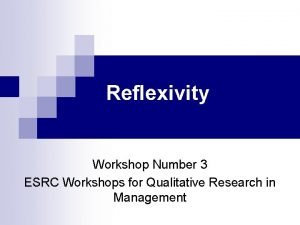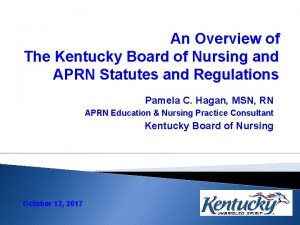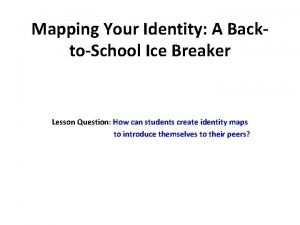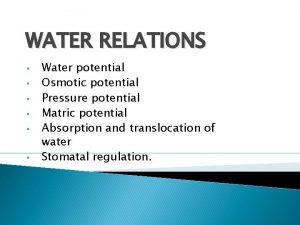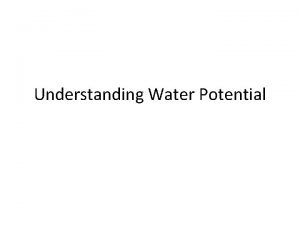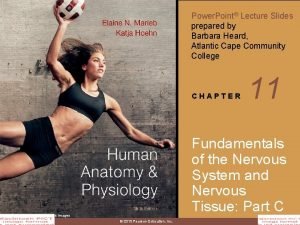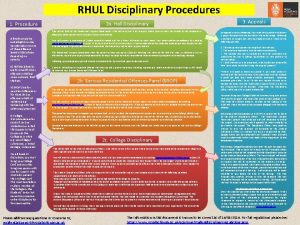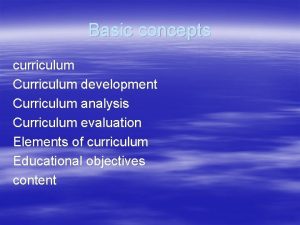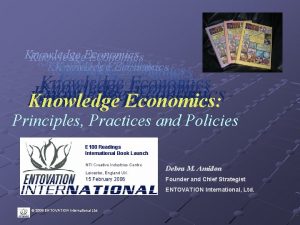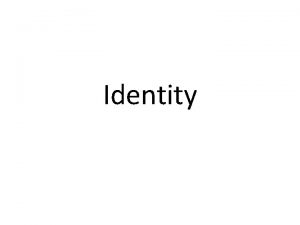The potential of disciplinary curriculum knowledge for identity












- Slides: 12

The potential of disciplinary (curriculum) knowledge for identity formation Reneé Smit Department of Electrical Engineering Centre for Research in Engineering Education (CREE) University of Cape Town

The context • Higher education as an engine for social mobility? • Educating for the professions – what is the distinction? • deep expert technical knowledge • specific professional competencies • strong professional identity • normative orientation • autonomy/self-regulation 2

The nature of engineering science knowledge: the study • Case study design, looking at thermodynamics knowledge • Knowledge as presented in undergraduate textbooks in 4 disciplinary areas: Sciences Engineering sciences PHYSICS CHEMISTRY MECHANICAL ENGINEERING CHEMICAL ENGINEERING

Differences between science and engineering…. 4

Theoretical concepts from the philosophy of science and engineering • Idealisation: distortion of reality for various purposes • Normativity: evaluative vs. descriptive nature of knowledge statements • Functionality, intentionality, volition (Mitcham, 1994; Houkes, 2009; Dancy; 2006) • “for-ness” of artefacts (Kroes, 2010) • Inherent normativity of technology (Radder, 2009) • Specialisation (from sociology): engaging with the fundamental purposes of the disciplinary fields, prioritising particular forms of knowledge 5

Disciplinary Field Telos Knowledge Orientation Engineering: Fundamental value: the design, construction, operation of artefacts to modify the human environment according to perceived needs Task, problem or function orientation (to exploit regularity to enable change) Science: Fundamental value: explain & understand the natural and modified world Theory-bound orientation (concepts find their meaning as part of a theory) (to map/explain regularity)

Disciplinary Field Knowledge Telos Orientation Modalities Engineering: Fundamental values: the design, construction, operation of artefacts to intervene in & modify human environment according to need Science: Fundamental values: explain & understand the natural and modified world Broad disciplinary fields Modes Towards particulars Task, problem or function orientation (to exploit regularity to enable change) Specialisation Towards universals Idealisation Theory–calibrated orientation (concepts find their meaning as part of a theory) (to map/explain regularity) Towards physical realisability Towards abstractideal theorisation Normativity Constitutive normativity Incidental normativity Nature of the knowledge 7

Entropy MECHANICAL ENGINEERING PHYSICS • Statistical thermodynamics: the average behaviour of large groups of particles • Irreversible processes are not impossible, just overwhelmingly improbable • Abstract mathematical approach: Highlynumber idealisedof ways energy quanta can be distributed amongst atomic oscillators (microstates); most probable macrostate is the only likely one • 2 nd Law: tendency of closed system towards max entropy: spontaneous processes lead to (disordered) dispersal of energy: more Value-neutral macrostates available to energy quanta • Concern: Generalisability. Theoretical concepts apply to whole of cosmos similar to cooling of cup of coffee Specialised for explanation Limited idealisation • Very little use for probabilistic approach; no need to know individual behaviour of particles • Empirical ‘macro’ properties: volume, temperature, pressure; incidental that these arise from micro-properties Specialised for artefacts • Engineering devices like internal combustion engines, steam turbines: transformation of energy • Energy has ‘quality’ as well as ‘quantity’ • “Dispersion of energy” becomes “degradation of energy” (normative) • Concern: usefulness, efficiency: “Entropy scares the hell out of an engineer!” Strong normativity

Findings Disciplinary knowledge differences and similarities KNOWLEDGE MODALITY MODE Specialisation Universals Idealisation MODE Particulars PHY Abstract theorisation CHE Normativity Incidental Influence of Field of Practice CEng MEng Physical realisability Constitutive

The Project: a longitudinal case study Disciplinary knowledge Schoolleavers • Two UK universities • Two SA universities • Two US universities CHEMICAL ENGINEERING Neophyte discipline specialists CHEMISTRY Undergraduate curriculum Student agency 10

Some early findings: developing a specialised disposition… “in first year, there is still an element of school and teacher and pupil relationship” (U 1 A 1). By final year they “know a lot of chemistry, and therefore we can have a much more equal debate and discussion” (U 1 A 1) Chem “…need to learn to move from memorising facts to recognising underlying patterns” (U 3 A 3)Chem Change in their “a sense of purpose and a sense of urgency” (U 2 A 2) Chem 11

Some early findings: developing a specialised disposition… becoming “different people” (U 1 A 3) Chem. Eng first years find it “a little bit of a shock when the ball is in their court” (U 1 A 3) Chem. Eng Need to move from “regurgitating knowledge” to -- “does it make sense? ” …learn to refer to “the fundamental concepts to see whether the Maths matches up with our understanding…” (U 3 A 3) Chem. Eng systems thinking: “understanding how the whole system works together” (Chem. Eng) the “furnace of the design project process “(U 2 A 4) move from “passively receiving information” to actively responding, “seeking out and engaging with learning”. At this level learning is “about valuing… having values that you internalise and organise”. In the end “these sorts of values start to characterise you… until you become that thing almost” 12
 Disciplinary curriculum
Disciplinary curriculum Disciplinary knowledge
Disciplinary knowledge Disciplinary reflexivity
Disciplinary reflexivity Disciplinary record higher pe
Disciplinary record higher pe Disciplinary literacy in physical education
Disciplinary literacy in physical education 201 kar 20:057
201 kar 20:057 Frisk letter of reprimand
Frisk letter of reprimand Ut arlington library
Ut arlington library Identity map
Identity map Flaccid cell
Flaccid cell What is water potential
What is water potential What is water potential
What is water potential Graded potential vs action potential
Graded potential vs action potential


